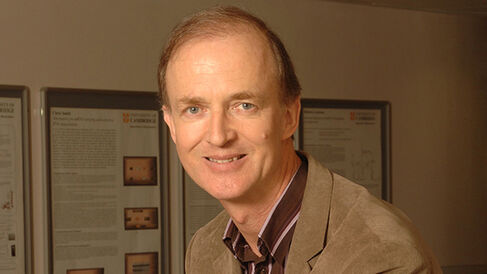
Professor Peter Leadlay, Herchel Smith Professor of Biochemistry, is retiring today, Wednesday 31st October.
Last month former members of the Leadlay Group held a Symposium in Peter's honour, attended by 130 delegates, to celebrate his research and illustrious career within our Department. Although this Symposium was a fantastic tribute, we cannot let Peter's retirement pass without some further recognition!
To mark the occasion, our Science Communications Team spoke to members of the Leadlay Group, both current and former, to find out more about Professor Leadlay as a Principal Investigator and to see what research life was like in his laboratory.
It was a privilege to join Peter's group at the end of his career and see that his scientific excellence was as strong as ever!
Rory Little, PhD Student
It immediately became clear that Peter was a highly approachable supervisor who was always willing to help and support his students and share his knowledge, with him adopting an open-door policy irrespective of the time of day. Kat Usachova, a PhD student of Peter's, commented that: "Peter is one of the most generous, caring and selfless people I know. His door is always open for you. Even in late hours he would not hesitate to offer his help and support, and always has your best interests in mind," with Rory Little, also Peter's PhD student, adding that: "Peter was a fantastic PhD supervisor. Right from the start he provided the support I needed to get comfortable and begin working happily in the lab. His door was always open when you needed to discuss ideas or pick his brains for his immense knowledge of natural products (or botany, history, literature, ornithology, classical music, anything really)."
From hearing their fond recollections of frequent social outings and retreats, it was also obvious that the Leadlay laboratory was a particularly close group of researchers. Rory Little continued by saying that: "The lab environment was always one of collaboration and assistance. Annual lab retreats provided an opportunity to discuss the field at large and facilitate group bonding. Memorable moments include walking along the Maltese coast one year, then walking in the snow and rain in Dartmoor the next." Another of Peter's PhD students, Karen Chan, also commented: "I truly cherish all the very fond memories of our group, including our punting trips to Granchester, Christmas dinners at Clare, lab retreats to Wales and Malta, the retirement symposium etc..."
Reflecting on Peter's retirement, Kat Usachova said: "Peter Leadlay is an exceptionally bright mind, an expert in many subjects in and beyond science, a true inspiration. No matter how tough your project might seem, a conversation with Peter is bound to give you fresh ideas, a sense of purpose, leave you feeling intrigued, energised, optimistic and courageous. Perhaps more importantly, he is my role model and I aspire to become at least a tenth of the great person he is."
Karen Chan added that: "It was a privilege and a great pleasure working with and learning from Peter. I can't thank Peter enough for offering me the opportunity to join the Leadlay Group, for introducing me to many beautiful polyketides and their very much fascinating biosynthetic pathways as well as for his immense support, guidance and encouragement, not only throughout my time in Cambridge but also after I left. I wish Peter a happy and healthy retirement."
Peter's passion for science, remarkable wittiness and humour, love for literature, history, cuisine, culture, and wine certainly made for very interesting teatime discussions.
Shilo Dickens, Facility Manager, DNA Sequencing Facility
In addition to Peter's research into polyketides and their biosynthesis, one of Professor Leadlay's major contributions to our Department was the establishment of our DNA Sequencing Facility. The Facility Manager, Shilo Dickens, said: "Peter began the DNA Sequencing Facility in the 1990s with John Lester managing the operation. Since the earliest days Peter allowed both strategic and tactical decision-making to be managed by the Facility Manager. Peter was consulted on projected major equipment purchases, space issues and occasionally on staff recruitment/retention issues and was always ready to lend wise counsel and guidance on any issue. I will always be very grateful to him for the opportunities working with this lab has afforded me and I hope he enjoys a well-deserved retirement."
Our Department is today sadly losing an outstanding scientist, exceptional supervisor, and devoted colleague, mentor and friend. We would like to take this opportunity to thank Professor Leadlay for all of his tremendous work over the last four decades, and we wish him all the best for his retirement and this new chapter ahead!
